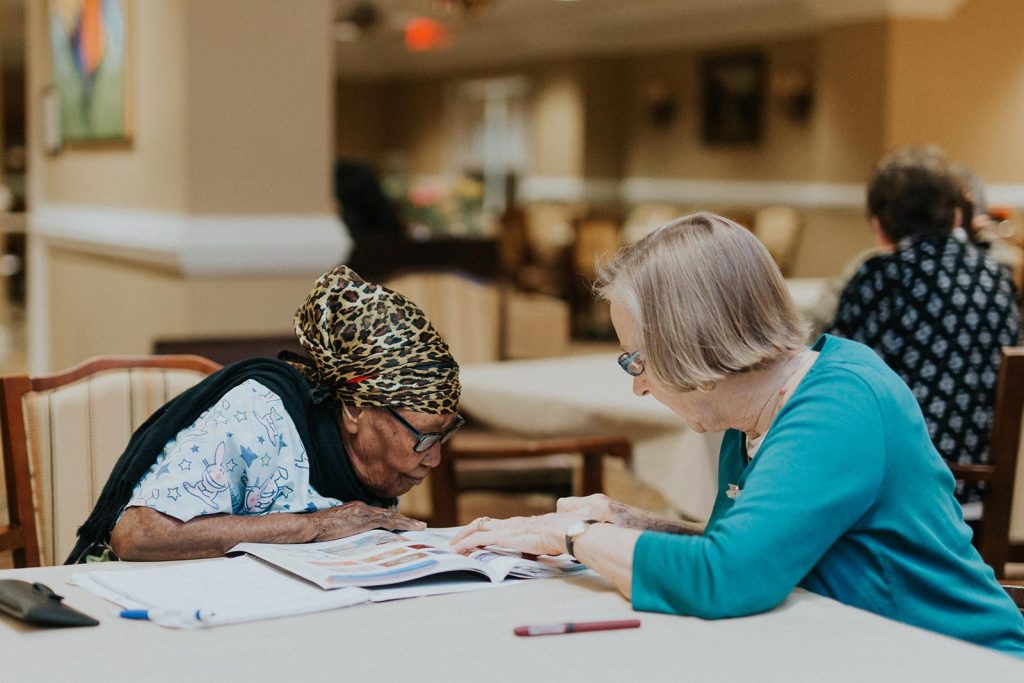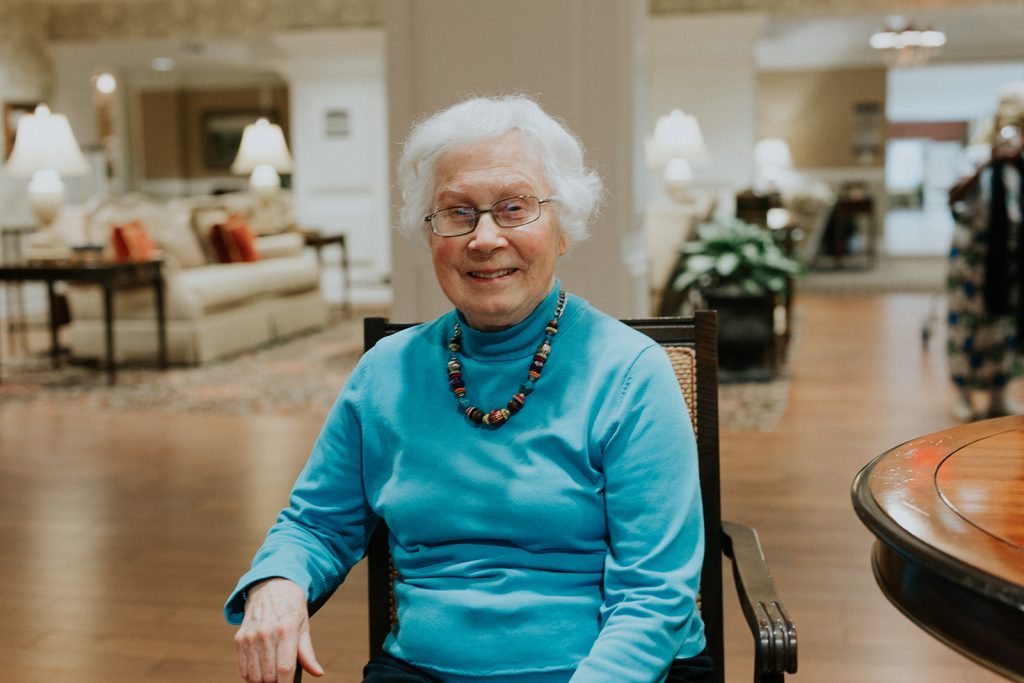As we approach Volunteer Appreciation Week in April, we are sharing inspiring stories of relationships between World Relief Memphis volunteers and our refugee and immigrant community. We’re confident you’ll agree with us, our volunteers are #LoveInAction!
If there was an award for most positively persistent volunteer, it might go to Julia Allen. At 92 years old, she is energetic, socially engaged, urgent about her desire to serve refugees in Memphis, and influentially persisted to see her plan to help them come to fruition.
Since the fall of 2017, Julia has volunteered with World Relief Memphis through organizing and leading a weekly English as a Second Language Class (ESL) for elderly refugees in her city. The class meets Wednesday afternoons and volunteer tutors are all fellow residents of her retirement community, Trezevant Manor. Julia was reminded about refugees in Memphis when someone from World Relief presented at her church. She recalled the joy she’d experienced in years past when she had volunteered with refugees, and she knew she wanted to help in some way again. She invited World Relief to speak at a luncheon at Trezevant Manor to ignite awareness in other residents as well; several expressed similar interest, but were curbed by lack of transportation to volunteer in World Relief’s traditional roles. “A lot of people in Trezevant want to be involved in service but have limited transportation,” Julia told us. But she was determined to help, wondering if somehow the refugees could come to Trezevant. “Karen from World Relief just made me care about the refugees. You know, when we talked, she said, ‘Maybe we can bring them here!’” An idea was born.

Julia and World Relief did find a way to bring refugees to Trezevant, and it has been a big success for both the residents of Trezevant and the refugee clients. Julia shared, “[One of] the really big things we’ve learned through this ESL class for these folks, [be]cause these are older folks…is they stay home. They’re the ones who babysit, they’re the ones who don’t know enough English to get out, so they stay home until their children can take them to the grocery, so they are housebound. So this is an outing, something they’re doing without their family. They’re coming together, and they love that.” World Relief staff can affirm this. Even after the very first class, one of the ESL students, content and smiling, said, “Today was a good day. I’m not alone.” Their new friends benefit from intentional, individual tutoring and the opportunity to practice English, often 2:1 volunteers to clients. “One of our men is 83, and he’s from Baghdad, and he can write a sentence! So he’s moving on big time, and we’re all excited about him! He’s our most enthusiastic…It’s just amazing at 83 to be so eager to learn…They all are so sweet, so appreciative.”
Julia spoke about other benefits she has seen. “I would like to think they are seeing some Americans who are friendly, warm, and helpful. They are excited to get out and see some of the world without somebody to lean on. They have become very friendly with each other. I think, and I hope, they feel that they’re making some progress.”
And the volunteers? “What we get out of it is immeasurable. It’s just a joy to live here and think that you’re doing something that is maybe beneficial to somebody else. You can get very isolated and self-centered here, and even happy, but not be contributing at all. And these people love what they’re doing.”
“Every time I visit the class at Trezevant, I feel it is a sacred space, I can’t really describe it any other way. These two groups of people together give me a glimpse of the Kingdom on Earth as it is in Heaven,” described Karissa Pletta, World Relief’s resettlement specialist responsible for Elders services.
Of course, the Elders’ ESL class hasn’t been without its challenges. Julia shared that she had to be selective about which residents to invite to volunteer with tutoring because of an experience with someone who vocalized not wanting to welcome refugees. “You know, when you’re only with people who are fearful, it’s really hard not to take on some of their fears,” Julia said. She also told us about her desire for this class to be more relational than transactional: “We don’t want it to be like, ‘We are the ones giving to you poor creatures!’ But instead, we are friends working together. And I think we’ve instilled that atmosphere.”
Their friendship was strengthened on a recent field trip to the Brooks Museum of Art in Memphis. Aware of their nationally touring exhibit, African-Print Fashion Now, the volunteer tutors suggested the joint visit for a tour and tea. The museum provided guided visits to historic portions of the museum as well as fabulous docent-led focus on the fabric exhibit. The afternoon fostered continued community building.
——————-
When scheduling a time to meet with Julia outside of the ESL class, she said, “Well, you can’t come at 9, that’s my water aerobics class. Be here at 10!” In a few hours together, hardly a single person, resident or worker, passed us by without offering a “Hello, Miss Allen! Good morning, Miss Allen! How are you doing today, Miss Julia?” Clearly, Miss Julia is not your average 92 year old, and when we sat down to talk, she wasted no time getting to the point. She had a story to tell, and she was ready to tell it.

What inspired Miss Julia to go above and beyond in the way that she has for these refugees? In addition to being an active community member (“My children say, ‘Mother, you’re never in your room, we can’t ever get you on the telephone!’”), serving others has been a part of Miss Julia’s life for a long time. “I’ve done a lot of mission trips with my church. I thought I wanted to be a missionary until I met my husband. I’ve just always been drawn to serve in some way. When I was younger, I was very shy. When I was in college, it was during the war, they had a program at church asking volunteers to go into communities where they were short-handed, and they just didn’t have enough people to do things. So I went to Mobile, Alabama, that summer. That was the first time I really just reached out. I think it was a formative time for me because I got over being shy. And then, I just went from there, because I wasn’t happy if I wasn’t doing something that I felt was helping. But you know the receivers are yourself. I, too, was finding out that this means far more to me than it could possibly mean to a refugee. And that’s what brotherhood and service and all those things, that’s what that means.”
Once Miss Julia knew there was something she could do to help refugees integrate more successfully, her empathy moved her to action: “You start thinking about what would I do if I had to leave everything I own, even the members of my family, and leave, run away for safety, and go through the ordeal of the refugee camp, and wait, wait, wait? And then come to a place that is so entirely different from their experience, not knowing anybody, not knowing the language, running into all different ways of doing things. I just thought, what would I do if I had to go to Congo and learn Swahili?”
Miss Julia offered advice for anyone who is hesitant to get out of their comfort zone and come alongside refugees as they rebuild their lives in America: “We’re so aware of refugees in Memphis now in a way that we were not before. There is a desire to do what we can. I just have to believe that you’re gonna find some more people that would like to do this. And you have to have faith. Even [if you think], ‘I’ve never done this, and I don’t know if I can.’ You can! And the only way to find out if you can is if you do it.”
Miss Julia, thank you for inspiring us with your example. You model Love In Action.
By Noah Rinehart, Intern, World Relief Memphis
Photos by Emily J Frazier/Emily Frazier Creative for World Relief Memphis
